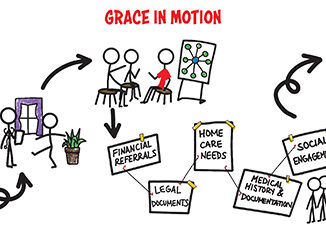The holidays are the most wonderful time of the year, right? Tis the season when families join together in harmony and appreciation for each other, right? In a perfect world, all families would enjoy their time together with the understanding that no family is perfect and the only pressure to make things perfect is self-imposed.
This leads me to the subject of expectations. I think we all have an image in our minds of how we expect holidays to look. They would include lots of laughter and bonding, no dissension or impatience, no hurt feelings or silent comparisons. In reality, most families have their issues, and heightened expectations at certain times of the year can easily end in disappointment.
If a family has a member with dementia, managing expectations becomes a particularly important task. Teaching other family members about the best way to communicate and interact or deflect and distract our loved ones with dementia can make for a much more pleasant experience for everyone. So here are a few dos and don’ts for the holidays if you have someone in your family with dementia.
 Almost inevitably there will be family members who refuse to acknowledge a loved one has dementia. It’s scary and it’s hard and it means changes in how we relate to that person. Acceptance is first and foremost in making holidays, and any days, easier to navigate for everyone. Acceptance does not mean giving up and it does not mean the person you love is less than they were before you accepted they have dementia. It just means you can now begin to learn in order to improve their and your own quality of life.
Almost inevitably there will be family members who refuse to acknowledge a loved one has dementia. It’s scary and it’s hard and it means changes in how we relate to that person. Acceptance is first and foremost in making holidays, and any days, easier to navigate for everyone. Acceptance does not mean giving up and it does not mean the person you love is less than they were before you accepted they have dementia. It just means you can now begin to learn in order to improve their and your own quality of life.- Did you know hearing difficulties often accompany dementia? Whether an actual inability to hear or the sensation of constant white noise, your loved one with dementia may very well be having a great deal of difficulty understanding voices high in pitch, people who are speaking from across a room, and someone speaking when there is a great deal of ambient noise. What to do?
Visit with your loved one in a quiet room with a minimum number of people. Remind everyone to speak with your loved one at eye level from close proximity, to lower their pitch and enunciate, and to try to avoid rooms where many people are speaking at once or where other sounds are prevalent (think kitchen noises). Such a simple solution can allow your loved one to feel included and safe. Imagine how you would feel if everyone around you was talking to each other, and at, but not to, you. Imagine the confusion and fear about what is going on around you. So take the simple steps here to help resolve the issue.
- In conversing with your loved one, remind everyone to ask simple questions if they ask any questions at all. Better than asking questions is starting a conversation about a period they might be able to retrieve in their memory – their childhood, your childhood, military service, when they married and so on. Nothing has to be complicated to make them feel engaged and not isolated.
Research has proven time and again that music is a powerful tool to help soothe anxiety and to engage the part of the brain that has wired itself to music and memories. Simply downloading a loved one’s favorite music to a basic iPod, or even putting it on a cassette tape or CD, then allowing them to listen through headphones, can create a whole world of comfort for them. And yes, you probably can still find a Walkman somewhere. Check out musicandmemory.org and aliveinside.org for more information about how music can help your loved one with dementia.
- Does your family serve a buffet on holidays or is food served family style? Are you using the good china and silver (not sure if people do that anymore, but I like it) or paper plates and plastic cups? Whatever your tradition might be, your loved one with dementia will have to make choices. Choices can be overwhelming. You can eliminate one choice right away by having them sit in a seat at the table that mirrors where they sit at their own table. Make sure anyone sitting next to them understands the challenges and is prepared to help them feel safe.
Motor skills tend to deteriorate as dementia progresses, so don’t expect your loved one to be able to handle utensils with the same facility they once could. Try to find a lovely plate with a raised outer edge so your loved one can bring their food off the plate by sliding it up the edge with their fork or spoon. Cut meat into bite size pieces. Know ahead of the big day what foods your loved one will probably prefer and prepare a plate for them ahead of everyone else serving themselves. Choices become very difficult. Presenting someone their plate as King or Queen for the day can remove any embarrassment or anxiety they might feel at the idea of making food choices. Cups with lids or straws can also be very helpful.
Perhaps most importantly, don’t expect more of your loved one than they can give, and don’t be disappointed in them if they fail to meet your expectations. In fact, don’t have expectations and enjoy the time for what it is. As family or friends of someone with dementia, we must accept the responsibility and the privilege of making their lives as positive and stress-free as possible. We simply must.
– by Elizabeth Downing
About the Author: Elizabeth Downing is Director of Outreach for Timesavers Concierge, Caregiving & Chauffeur in Bowling Green. A 1982 graduate of WKU, Elizabeth found her passion in advocating and providing care for older adults and those with special needs. Elizabeth’s work seeks to raise awareness of issues relating to aging and caring for aging loved ones, and to let people know they are not alone in the journey. She has completed a Certificate in Care Management from Boston University, and facilitates two family caregiver support groups each month.



